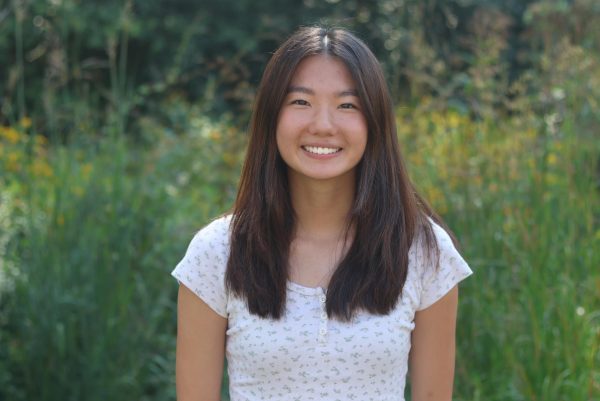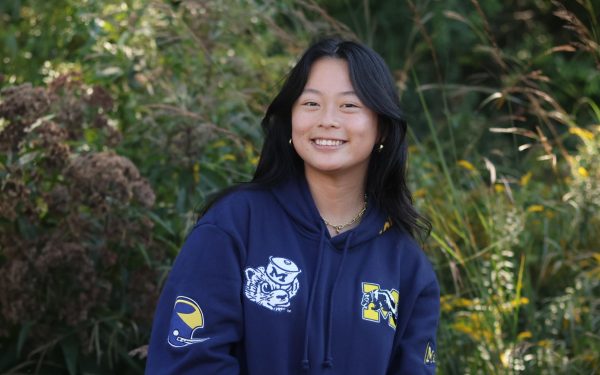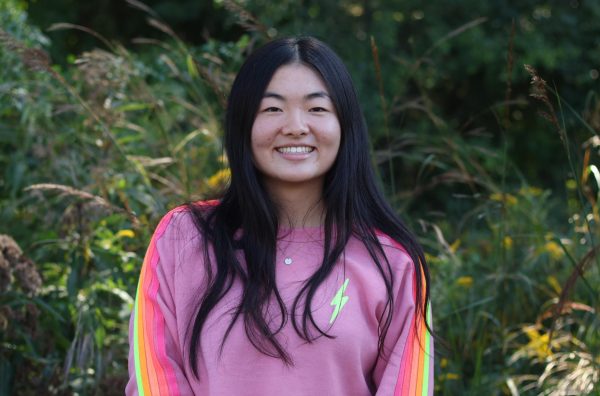Asians on Air Episode 1: Microaggressions
November 26, 2022
In this episode of Asians on Air, WSPN’s Tina Su, Hallie Luo and Selena Liu discuss microaggressions in Wayland. They share specific experiences and explain their impacts.
Introduction: 00:00
Football Game Anecdote: 00:40
Middle School Crush Anecdote: 2:01
Academic Stereotyping: 4:03
Summer Camp Anecdote: 8:18
Outro: 10:04
Transcript:
Tina Su: Hi, WSPN and welcome to our very first episode of the reboot of WSPN’s podcast, Asians on Air. I’m Tina Su and with me is…
Hallie Luo: Hallie Luo.
Selena Liu: Selena Liu.
Tina: Selena, what is our topic for today?
Selena: Today’s topic is our experiences with racism against Asian Americans at Wayland High School, specifically our own experiences as public school students growing up in the Wayland district.
Hallie: Personally, I feel like there haven’t hasn’t been a ton of major, blatant racist attacks against Asian Americans here at school. I do feel like there’s a lot of stigma and stereotypes underneath the surface that people feel and a lot of microaggressions that have grown throughout the community.
Tina: Hallie, do you have a personal experience of this?
Hallie: I specifically remember a time in middle school when I showed up at a football game. There’s a kid who’s in my math class. I was very academically driven, and so getting there with my other friends, this one student takes one look at me, looks me up and down and goes, “Hallie, shouldn’t you be at home doing math?”
Selena: That’s horrible.
Hallie: I was so starstruck by how completely shameless it was for him to say that in front of a lot of people.
Tina: What was the reaction of all of his friends? Did they laugh?
Hallie: His friends just shrugged it off. It seemed like this was a normal thing for this person to say. Obviously, my friends tried to defend me, but we’re middle schoolers, so there was nothing much we could do. The problem here is that we’re just kids. So if I were to retaliate, and tell him, “That’s not okay to say,” people would think, ‘Oh, she can’t take a joke. Or she’s stingy because she just can’t understand that what I said was funny.’
Tina: I think snowflake is definitely a big word that’s used to make people feel bad about being rightfully offended by something that somebody says.
Selena: What makes this a lot worse is that the boy who said this definitely does not remember what he said. However, as receivers of these microaggressions and racist hate, these memories have stuck with us forever. We’re 16 and 17 now, so this was years ago, but we remember every single word that was said to us that made us feel absolutely horrible about ourselves.
Hallie: It’s extremely one-sided. To him, it was probably just a daily encounter. But for me, it’s something I’ve remembered years later.
Tina: I think another encounter that I remember — it actually had a really big impact on who I am today — is I had a crush on a boy in middle school. And one of my friends snapped him or something and said, “Oh, Tina likes you.” And I remember his response vividly. He said, “Sorry, I only like Americans.”
Selena: That’s crazy, there are so many things wrong with that.
Tina: This was a big thing for me. Because I think every single guy that I liked after that, or every single time I had that experience, I would flashback to that. And I would think that he would never like me because I’m Chinese.
Hallie: Yeah, I 100% relate to that. Even though that hasn’t happened to me specifically, we all have the idea in our head that people aren’t available because we don’t know if they’re even into Asian girls, especially in our town.
Selena: The fact that he said “Americans” is another big issue because it insinuates that non-white people can’t be Americans, even though…
Hallie: We are Chinese-American.
Selena: Even though we were born here, we were raised here and English is our first language. That is just a really big stab in the heart. We’ve grown up our entire lives here. This is all we know. Yet, we are told that we don’t belong here.
Tina: We are just as much American as anybody else because we’ve had the same exact experiences. It’s just that we look different. I also think the reason that a lot of these incidents happened in middle school is because younger kids will just reflect what their parents say, and what their parents believe. So by high school, these kids have developed, and at least have a sensor or a filter of what to say and what not to say. But in middle school, they don’t know that. So when a middle school boy is the one saying these things to me, I reflect now and I’m thinking, “This is not what they were actually thinking. It just reflected what their parents believed.”
Hallie: I look back and I can’t really blame the kid. It’s easy to say what he said was completely wrong and it definitely was, but it’s hard to look at the true morality of that person as someone who’s racist, because they grew up thinking that it was okay. And also, it’s a ten-year-old kid who’s saying these things, so I just feel pity that their parents brought them up in a way that they thought was okay. I really just hope that these people like that have learned from that.
Tina: I think that’s just how generational and systemic racism is created and developed because kids are not born racist. That’s how they’re brought up.
Hallie: I totally agree.
Tina: I also think another example of a microaggression is people assuming that just because we’re Asian, we’re smart. Although somewhat we do fit that stereotype, it’s not a good premonition to have before you talk to somebody. I remember in middle school, I had a best friend who was white. I would say that me and her were both at the same level, but to our classmates, she was some genius, and I was just normal. People would come up to me and say, “Oh, isn’t she so smart? I heard she is really smart.” But I was thinking, “She and I do the same, we do all of our work together. Sometimes I even help her with stuff, but to other people I’m seen as just a normal Asian kid. But for her, she’s an insanely smart white kid so she automatically deserved so much extra respect.”
Hallie: I feel like a lot of people think of that stereotype as just like, “Well, it’s true,” but it’s so much deeper than that in the way that people assume things before knowing. I feel like a lot of the time when people are talking about someone who’s Asian, they’re like, “Oh, but they’re Asian, they’re smart.” When they don’t know the person at all, whereas you can make the judgment of a white person and not associate them with intelligence right away.
Tina: I think that can also negatively affect an Asian kid, because they can be average in school and in general, but other people would be like, “Oh, you’re dumb.” That would create a negative premonition in their head that they’re dumb, even though compared to any other kid, they’re average, they’re fine. But since other people expect this Asian kid to be smart just because of the way they look, they’ll think they’re dumb.
Selena: I also think like most people who have good grades — obviously, there’s some exceptions — work hard for it, and they are willing to put in hours of work, meet with the teacher and go over the mistakes. By assuming that all Asian people are smart, it really takes away and downplays the amount of effort that we put in, into doing our homework, because no, most people aren’t naturally smart. Everyone has to study for things. For us, as averagely intelligent people, we need to put in so much work. For example, I will spend hours a night doing homework.
Tina: I also think with, first of all, the college admission stuff, and just assuming Asian people are smarter also gives the impression that people think they’re just born smarter. I think that’s definitely a negative impact. I would say it’s not that we’re born smarter, it’s that we’re born into good academic habits. From a very young age, my parents brought me up in a way where they taught me how to put in the hard work, and how to build a good foundation.
Hallie: I think it’s also just because we’re born Chinese. In our surroundings, people tell us, our Chinese community and family, everybody that we know that’s Chinese, will tell us about all the Chinese people that are smart. This pressures us to study harder, and I think that the expectation of a Chinese girl’s studies is so much higher too, even though it shouldn’t be at all.
Tina: Yeah, I think that’s true. For me personally, it’s definitely the habits that I developed when I was younger that gives me a head start. I remember when I was younger, on the way to kindergarten or first grade — there’s a Chinese poem that helps you remember your multiplication tables — and I remember every single day on the way to kindergarten, my mom and I would just memorize this poem. By the time I went into first grade, I had up to my nines in multiplication memorized. I think at that point, it definitely was, “Oh, I got a head start,” only because my Asian parents taught me a good habit. And that’s the only reason it was a head start. It’s not because my brain is different or anything.
Selena: I also think it’s important to note that even though racism isn’t always out-right, it can also just be felt, which is equally as valid. Racism isn’t always necessarily put into words, it’s just the small things –the way that we’re treated, the way that we talk to, the way people can look down on us. Those are things that you can feel.
Tina: Just having a condescending tone can tell us how you feel. People don’t necessarily have to say what they think. But there can just be a tone that our classmates talk to us that will take me back and be like, “Oh, I can tell how you feel about me just by the way you’re talking to me.”
Hallie: I can also see how the lack of words shows a lot too. If someone chooses to only talk to certain people and just look down at others and just ignore us — we’re hidden in the shadows because we’re Asian — that is racism.
Tina: I think that is a big thing at Wayland High School. If you just generally look at what is considered popular or cool at Wayland, it’s predominantly white. I won’t even say predominantly white, it’s 100% white. There’s like maybe a couple exceptions — 99%. Although Wayland High School is a very white school, I wouldn’t say that warrants a 99% white popular group, it’s like everybody who you look at and consider popular at our school. I feel it’s almost like there are requirements, and I feel like the first requirement is that you’re white.
Hallie: Selena, do you feel like there’s a specific event where you’ve felt this type of racism, not heard it, but you felt it even though it wasn’t completely directed at you?
Selena: So at this summer camp, while I was sitting with my group of friends, I overheard this boy screaming slurs at a group of Asian boys. He was singing “ching chong ching chong,” and I remember thinking “What the heck?” There’s no way this is happening, this is stuff that you hear about, but you don’t think it’s going to happen to you in-person. This was not even directed at me, but I just remember that tears just started welling up in my eyes. After the initial tears ran out, I was so angry because no one around me was saying anything. The thing with racism is that by not standing up for it, you are allowing it. Racism needs to be stood up against specifically by those people who are targeted. So I remember going up, storming over to this boy, and I screamed, “Do you want to repeat what you just said? You are being so racist right now!” And this boy just started laughing. Are you kidding me? I was just so upset. I cried the entire afternoon and night.
Tina: I think a big point of that is just because you can say and defend yourself in the situation — “Oh, I wasn’t the one being racist.” Especially if you are not the targeted group of people, if you’re not Asian, and you’re in that situation and you see it and you don’t like what you’re seeing, saying something can mean a lot. Even if you don’t think it will, in that situation, that type of person, if they saw a white person come up to them and say something, they would have probably shown them more respect and taken them more seriously. I think that’s really important because that would have probably changed the situation.
Hallie: It’s also really, really hard to stand up and say something. It’s extremely hard. It’s sad that we have to do that because we’re this young — what 13-years-old? And I was 11-years-old — these kids shouldn’t be expected to stand up for themselves when being attacked. This shouldn’t be even happening at all.
Selena: I know for a fact that the boy who said this definitely doesn’t remember, but every single time I see him, the first thing that comes to my mind is what he said, how it made me feel and the fact that no one did anything.
Tina: On that note, sorry, that’s kind of a heavy note to end up on. Thank you guys for listening to our first episode of Asians on Air, there’s many more topics to come. We’re very happy that you’ve reached the end of this podcast.
Hallie: See you next time!
All: Bye!





![Last Wednesday, the Wayland School Committee gathered to discuss a number of topics regarding the health curriculum and Innovation Career Pathway course. Another large topic of conversation was the ways to potentially mitigate distracting cell phone usage. "These [phones] are going to distract your learning and social relationships," Superintendent David Fleishman said. "That's concrete right there."](https://waylandstudentpress.com/wp-content/uploads/2025/06/Screenshot-2025-06-04-at-9.49.31 PM-1200x886.png)



























![Troy Hoyt finishes the Boston Marathon, running for the Hoyt Foundation. T. Hoyt is the son of Hoyt Foundation CEO Russ Hoyt.
“[Running a marathon] might seem like a big thing, when it’s presented to you at first, but if you break it up and just keep telling yourself, “Yes, you can,” you can start chipping away at it. And before you know it, you’ll be running the whole 26 miles, and you won’t even think twice about it.” T. Hoyt said.](https://waylandstudentpress.com/wp-content/uploads/2025/04/C36E8761-1CBB-452E-9DF2-543EF7B1095E_1_105_c.jpeg)















































random freshman • Nov 28, 2022 at 11:59 PM
Wow, this is remarkable. One of my biggest gripes with the Wayland(TM) district is that although it’s preached that “we are a welcoming community” and that “discrimination isn’t tolerated”, it is still rare to see spaces dedicated to down-to-earth discussion, even when needed the most.
However, I think I’ve been blown away by how close this hits to home and am caught wide-eyed at how important my own experiences really are, even though I’ve dismissed them as me being too sensitive or emotional. Just following along has been incredibly validating, and I imagine it also would be for others as well.
I hope y’all keep doing this, and I can’t wait for the next episode.